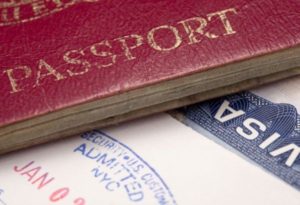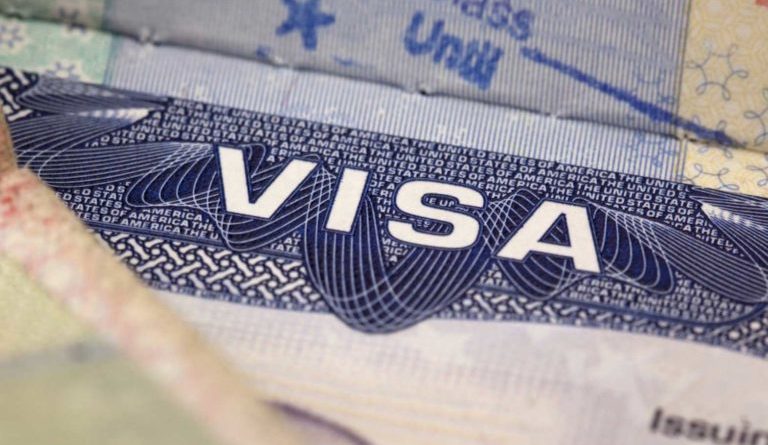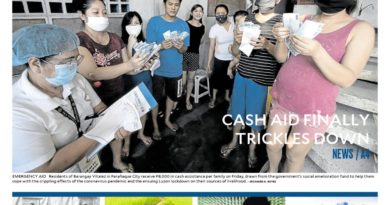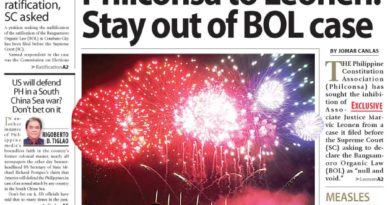OPINION/COLUMN-US VISA | |Will Visa Bulletin move faster now?
A NUMBER of people have inquired whether America’s turn to the right and Donald Trump’s triumphant return to the White House will result in faster scheduling of consular appointments as well as the forward movement of dates in the monthly Visa Bulletin and vice versa.
Visa interview dates are doled out at consular posts worldwide based on its priority scheduling, which puts immediate relatives (IRs) of US citizens first — spouse, minor child and parent.
The next batch of interview dates go to the family preference category applicants from the National Visa Center (NVC) only after being informed of available slots by the US Embassy: such availability is subject to “limited consular post facilities, including staffing” support.
All immigrant visa applicants, regardless of prioritization, must 1) have their priority dates current and 2) be documentarily qualified (DQ).
Immediate relatives of US citizens need not watch how fast or slow the Visa Bulletin dates move.
They are not subject to the annual quota. Once a petition for an IR is approved by the US Citizenship and Immigration Services (USCIS), an immigrant visa is immediately available — no waiting for visa dates to move forward.
The only drawback is that individual petitions must be filed for a spouse, child or parent. Unlike the family preference category visa applicants, one petition (for the principal applicant) allows the spouse and minor children the same immigrant classification and priority date.
Since the pandemic, visa dates — both under charts A and B — have not moved or crawled forward at best.
Chart A indicates that the principal applicant and qualified derivative beneficiaries — whose priority date is on or earlier than indicated in the current Visa Bulletin — should expect an interview notice date after being considered DQ.
Chart B shows the dates by which applicants may start their visa processing with NVC if their priority date is on or earlier than that shown in their specific category.
This has been the cardinal rule that the State Department has in place since the Immigration Act of 1990 increased the number of visas available to the family-sponsored categories.
What determines the visa date movement published in the Visa Bulletin?
First, the current visa allocation in the family and employment-sponsored categories remains intact pursuant to the 1990 Act and shown in the December 2024 Visa Bulletin:
“The fiscal year 2025 limit for family-sponsored preference immigrants determined in accordance with Section 201 of the Immigration and Nationality Act (INA) is 226,000. The worldwide level for annual employment-based preference immigrants is at least 140,000. Section 202 prescribes that the per-country limit for preference immigrants is set at 7 percent of the total annual family-sponsored and employment-based preference limits, i.e., 25,620. The dependent area limit is set at 2 percent, or 7,320.”
In short, whoever is president cannot unilaterally change the visa allocation: it is Congress that authorizes visa numbers.
Second, it was President-elect Trump who issued decrees prohibiting the admission of immigrants in 2021 to “protect Americans and American jobs.”
That promise and premise also remain not just during the campaign trail but even after the victory speeches.
Stephen Miller, who worked in the White House during the first Trump administration as a senior adviser to Trump and as director of speechwriting, emphasized this during Trump’s Madison Square rally immediately before the election. He told the crowd that “America is for Americans and Americans only” and promised to “restore America to the true Americans.”
Third, while the focus of the incoming administration’s immigration policy is “mass deportation” and securing the border, there has been no move to alleviate the visa backlog created by the twin decrees in 2021.
What Visa Bulletin does
The monthly publication of the State Department (now to be headed by Florida Sen. Marco Rubio) simply publishes the priority dates of immigrant visa applicants who may be scheduled for interview (under chart A, final dates) as well as those who may start visa processing if their priority date is on or earlier than the published cut-off date on the current Visa Bulletin.
NVC does not have a hand in increasing or reducing visa allocation or prioritizing interview schedules. The agency’s role is limited to processing the documents submitted and determining when an applicant would be considered DQ.
The December 2024 Visa Bulletin (Chart A) shows an average two-year wait for DQ applicants to expect an interview date.
In the case of a Philippine F1 principal applicant (unmarried son/daughter of a US citizen), for example, the gap between the visa filing /processing date and the final/interview date is over two years.
F1 applicants whose priority date is April 21, 2015, may already start visa processing after receipt of a case creation letter from the National Visa Center (NVC).
On the other hand, F1 visa applicants whose priority date is March 1, 2012 — and who are already “documentarily qualified (DQ)” should expect interview appointments because the priority date is current, and visas are immediately available.
However, the visa backlog gets in the way.
In the last update by NVC in September 2024, the number of DQ applicants with NVC remains at 408,937 (Chart B).
Can the second Trump administration move priority dates faster?
Yes, but only through at least two executive orders.
1. Create a new nonimmigrant visa category targeting principal applicants and derivative beneficiaries who may qualify based on set criteria with skills, age and experience in the occupation as primary requirements.
2. Through legislative allies in Congress that the Republican Party now dominates, President-elect Trump reintroduces a points-based migration system (PBMS) with higher points rewarded to those with approved petitions and already considered DQ.
Under PBMS, DQ immigrant visa applicants who meet the skills, age, and language proficiency requirements may be prioritized for processing to help alleviate worker shortage in the US.
This may be wishful thinking, but wishing is all we can do.
.
.Ads by:.
 Memento Maxima Digital Marketing
Memento Maxima Digital Marketing
@[email protected]
SPACE RESERVE FOR ADVERTISMENT
.
.



 Memento Maxima Digital Marketing
Memento Maxima Digital Marketing






